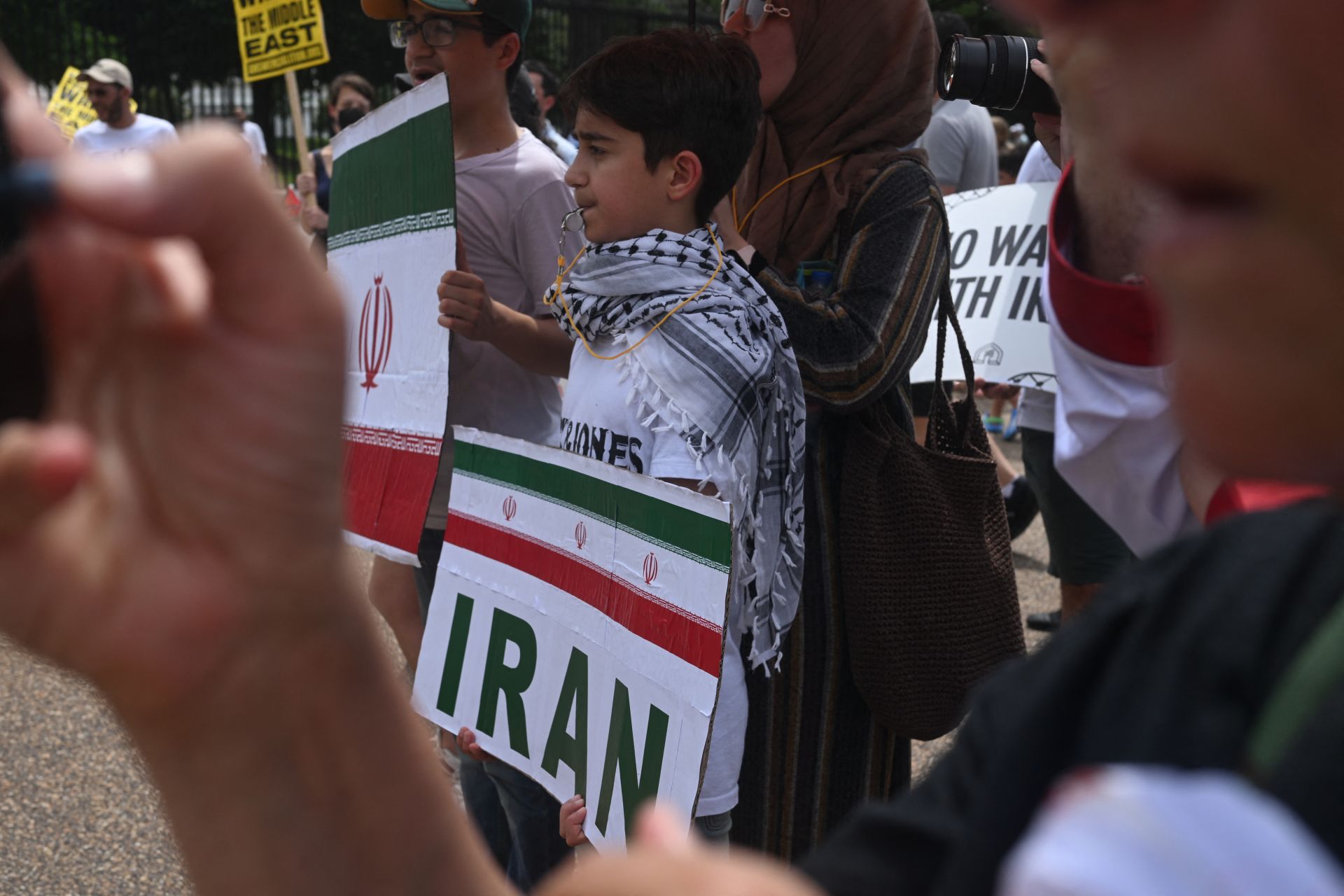- Home
- Middle East
- Day 11 of The Iran-Israel War: Latest Developments

People hold placards with Iranian flags as they demonstrate in front of the White House in Washington, DC, on June 22, 2025 against US strikes on Iranian nuclear sites. ©Alex WROBLEWSKI / AFP
As the eleventh day of the Iran-Israel conflict unfolds, the situation remains fraught with military escalation, diplomatic tension, and worldwide market and political ramifications.
Missile exchanges continued Monday between Iran and Israel, which is persisting in targeting specific objectives within the Islamic Republic. In the morning, Tel Aviv launched another attack on Iran’s Fordow nuclear site, buried under a mountain south of Tehran, according to a local media report.
“The aggressor has once again attacked the Fordow nuclear site,” reported the Tasnim news agency, citing a spokesperson for the crisis management authority of Qom province, where the site is located.
According to an Israeli source cited by Al-Hadath, “the entrances to Fordow were targeted to prevent the Iranians from removing the materials” still stored there.
These strikes follow U.S. airstrikes a day earlier on Iranian nuclear sites, including Fordow, as well as the Natanz and Isfahan facilities in central Iran, where the extent of the damage remains to be assessed.
Israeli strikes were also underway early Monday afternoon on the headquarters of the Revolutionary Guards in Tehran and Evin prison, the Israeli military announced, as Iran once again warned the United States of “severe consequences” in response to the unprecedented attacks on its nuclear facilities, and cautioned about a possible “expansion of the war” in the Middle East.
Air raid sirens sounded for over 30 minutes across several regions of Israel on Monday, shortly after the military warned of multiple missile salvos launched from Iran.
According to initial assessments by the Israeli army, approximately six to seven ballistic missiles were launched in four successive waves. The missile fire spanned nearly 40 minutes, marking one of the longest Iranian attacks since the beginning of the conflict.
While there were no immediate reports of casualties, several missile impacts were confirmed on Israeli territory.
The Israel Electric Corporation (IEC) reported power disruptions in several southern towns following the impact of an Iranian missile near a strategic infrastructure site in Ashdod.
"Teams are currently on their way to affected locations to restore power as quickly as possible. Operations include infrastructure repairs and the removal of safety hazards, in coordination with security forces," the IEC said in a statement.
More than 30 minutes after the sirens began, the military issued a notice stating that civilians could leave their shelters. Emergency services have not reported any injuries so far.
Meanwhile, powerful explosions were heard in northern Tehran, according to AFP journalists. The Iranian Red Crescent announced that Israeli airstrikes occurred near one of its buildings in the capital.
Trump Hints at Regime Change, Praises Strike Impact
US President Donald Trump has amplified the rhetoric by openly suggesting that "regime change" in Iran is a plausible outcome if the current leadership fails to “make Iran great again.” In a statement posted on Truth Social, Trump hailed what he described as “monumental damage” inflicted on Iran’s nuclear infrastructure, claiming “obliteration is an accurate term” to describe the US-led airstrikes, and referring to them as a "bullseye.”
President Trump proclaimed the operation a “spectacular military success,” warning Iran that it must “now make peace,” and floated the idea of regime change should Iran’s leadership fail to meet his objective of “Make Iran Great Again.”
However, top administration officials have attempted to draw a distinction between targeting Iran’s nuclear program and engaging in broader conflict. Vice President JD Vance emphasized that the US is “not at war with Iran,” but rather with its nuclear ambitions, while Secretary of State Marco Rubio insisted Washington is “not looking for war.”
According to the Pentagon, B-2 stealth bombers targeted three key Iranian nuclear sites – Natanz, Fordo, and Isfahan – in what has been called one of the most secretive US air operations in recent history. The International Atomic Energy Agency (IAEA) has yet to fully assess the extent of the damage, citing limited access and ongoing hostilities.
Strategic Calculations and Delicate Diplomacy
Despite the sharp rhetoric, key figures in Washington, including Secretary of State Marco Rubio and Vice President JD Vance, have emphasized that the US is not seeking a full-scale war with Iran. Officials insist the strikes were limited to degrading Iran’s nuclear capabilities.
However, Iran’s leadership views the attacks as a declaration of war. North Korea, joining the fray with a statement of support for Tehran, accused the US of violating the UN Charter and blamed Israel for regional instability.
Tehran Reacts: No Talks Before Retaliation
Iran has remained defiant. Foreign Minister Abbas Araghchi, currently in Moscow, stated that Iran would consider all possible responses and that no diplomatic engagement would resume until it had retaliated appropriately. “The US has shown it only understands the language of force,” Araghchi said in Istanbul prior to his visit to the Kremlin, where he is expected to meet President Vladimir Putin.
While Moscow has condemned the US strikes, describing them as a dangerous breach of international norms, it has stopped short of offering military support. Kremlin officials maintain ongoing communication with both Tehran and Washington.
A social media account linked to Iran’s Supreme Leader Ayatollah Ali Khamenei issued a strong statement condemning Israel’s actions, calling them a serious miscalculation. In what appears to be his first public reaction since the United States became directly involved in the conflict, the message posted on X (formerly Twitter) declared: “The Zionist enemy has made a grave mistake, committed a great crime; it must be punished and is being punished; it is being punished right now.”
Iran's judiciary said it executed on Monday a man found guilty of spying for Israel, as fighting between the two countries entered its 11th day.
"Mohammad-Amin Mahdavi Shayesteh was hanged this morning for intelligence cooperation with the Zionist regime," the judiciary said, using Iran's term for Israel.
Shayesteh was alleged to have had ties with Mossad, Israel's foreign intelligence agency.
He was also convicted of collaborating with Iran International, a Persian-language TV channel based in London that is critical of the Iranian government. Iran considers the broadcaster to be linked to Israel.
Israel Continues Strikes, Seeks Strategic Objectives
Israel, for its part, has intensified its operations. The Israeli Air Force reportedly launched strikes on “dozens of military targets” across Iran, including a strategic missile facility in Yazd, the first confirmed attack on that location. Israeli Prime Minister Benjamin Netanyahu stated that Israel is close to achieving its objectives: neutralizing Iran’s ballistic missile capabilities and crippling its nuclear ambitions.
Israel's army said it was striking military sites in western Iran's Kermanshah on Monday.
More than 15 Israeli Air Force fighter jets struck a short time ago in the Kermanshah region of western Iran, destroying several launch sites and storage facilities for surface-to-surface missiles aimed at Israeli territory, a military statement said.
The Israeli army announced that it had targeted six airports located in western, eastern, and central Iran. According to the army spokesperson, the strikes damaged runways, underground hangars, a refueling aircraft, and a fleet of 15 fighter jets and helicopters, including F-14s, F-5s, and AH-1s, all belonging to the Iranian military.
Ten Revolutionary Guards soldiers were killed in Israeli strikes on Sunday in Yazd province in central Iran. This was reported by the Iranian news agency Tasnim.
Global Responses and Warnings
World leaders and institutions have issued a flurry of statements urging restraint. The United Nations has warned of a “dangerous escalation,” with its nuclear watchdog calling the situation “deeply destabilizing.”
European powers, including the UK, France, and Germany, issued a joint call urging Iran to return to negotiations and warning against any further moves that could destabilize the region. Australia's Prime Minister Anthony Albanese voiced strong support for the US action while reiterating the need for diplomacy.
Meanwhile, China has been urged by US Secretary of State Marco Rubio to pressure Iran to keep the Strait of Hormuz open. Iran’s parliament recently approved a resolution to close the strategic waterway, though the decision ultimately lies with the country’s security apparatus. The strait, a vital artery for global energy trade, is now at the center of international concern.
Markets and Civil Aviation Disrupted
The military strikes have rattled global markets. Brent crude jumped over 3% in early trading on Monday, reflecting fears of disruption in oil supplies. Airlines worldwide, including Singapore Airlines and Air France, have rerouted or suspended flights to parts of the Middle East amid heightened security risks and closed airspace over Iran, Iraq, Syria, and Israel.
Flight tracking data shows vast no-fly zones forming over the region. The airline risk-monitoring site Safe Airspace flagged the situation as “high risk,” particularly for US carriers.
Domestic Fallout and Protest Movements
The strikes have also triggered protests across multiple cities around the world, with demonstrators condemning what they describe as American aggression. In New York, London, Istanbul, and Kuala Lumpur, citizens rallied in opposition to the war, calling for a return to diplomacy.
The US State Department has issued a global security alert for American citizens, citing the potential for retaliatory actions against US interests.
Looking Ahead
President Trump is set to meet with his national security team in the Oval Office later today to assess the next phase of operations. The White House has not ruled out further action but insists any future decisions will depend on Iran’s response.
With AFP
Read more



Comments